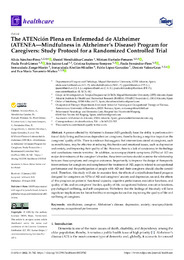Por favor, use este identificador para citar o enlazar este ítem:
https://hdl.handle.net/11000/31296Registro completo de metadatos
| Campo DC | Valor | Lengua/Idioma |
|---|---|---|
| dc.contributor.author | Sánchez Pérez, Alicia | - |
| dc.contributor.author | Mendialdua Canales, Daniel | - |
| dc.contributor.author | Hurtado Pomares, Miriam | - |
| dc.contributor.author | Peral Gómez, Paula | - |
| dc.contributor.author | Juárez Leal, Iris | - |
| dc.contributor.author | Espinosa Sempere, Cristina | - |
| dc.contributor.author | Fernández Pires, Paula | - |
| dc.contributor.author | Zango Martín, María Inmaculada | - |
| dc.contributor.author | Abellán Miralles, Inmaculada | - |
| dc.contributor.author | López González, Pablo | - |
| dc.contributor.author | Valera Gran, Desiree | - |
| dc.contributor.author | Navarrete Muñoz, Eva María | - |
| dc.contributor.other | Departamentos de la UMH::Patología y Cirugía | es_ES |
| dc.date.accessioned | 2024-02-08T11:53:39Z | - |
| dc.date.available | 2024-02-08T11:53:39Z | - |
| dc.date.created | 2022-03 | - |
| dc.identifier.citation | Healthcare (Basel) 2022 Mar 15;10(3):542 | es_ES |
| dc.identifier.issn | 2227-9032 | - |
| dc.identifier.uri | https://hdl.handle.net/11000/31296 | - |
| dc.description.abstract | A person affected by Alzheimer's disease (AD) gradually loses the ability to perform activities of daily living and becomes dependent on caregivers, thereby having a negative impact on the caregivers' quality of life. There is evidence that suggests that interventions aimed at caregivers, such as mindfulness, may be effective at reducing this burden and emotional issues, such as depression and anxiety, and improving their quality of life. However, there is a lack of consistency in the findings and conclusions remain tentative. In addition, as neuropsychiatric symptoms (NPSs) of AD are major determinants of the caregiver's burden, these interventions should examine the relationship between these symptoms and caregiver outcomes. Importantly, to improve the design of therapeutic interventions for caregivers and complement the treatment of AD, aspects related to occupational performance and the participation of people with AD and their caregivers should also be considered. Therefore, this study will aim to examine first, the effects of a mindfulness-based program designed for caregivers on NPSs of AD and caregivers' anxiety and depression; second, the effects of this program on patients' functional capacity, cognitive performance, executive functions, and quality of life, and on caregivers' burden, quality of life, occupational balance, executive functions, psychological wellbeing, and self-compassion. We believe that the findings of this study will have significant implications for future healthcare strategies focused on improving the quality of life and wellbeing of caregivers | es_ES |
| dc.format | application/pdf | es_ES |
| dc.format.extent | 16 | es_ES |
| dc.language.iso | eng | es_ES |
| dc.publisher | MDPI [Commercial Publisher] | es_ES |
| dc.rights | info:eu-repo/semantics/openAccess | es_ES |
| dc.rights | Attribution-NonCommercial-NoDerivatives 4.0 Internacional | * |
| dc.rights.uri | http://creativecommons.org/licenses/by-nc-nd/4.0/ | * |
| dc.subject | Alzheimer’s disease | es_ES |
| dc.subject | anxiety | es_ES |
| dc.subject | caregiver | es_ES |
| dc.subject | depression | es_ES |
| dc.subject | mindfulness | es_ES |
| dc.subject | neuropsychiatric symptoms | es_ES |
| dc.subject | occupational performance | es_ES |
| dc.title | The ATENción Plena en Enfermedad de Alzheimer (ATENEA-Mindfulness in Alzheimer's Disease) Program for Caregivers: Study Protocol for a Randomized Controlled Trial | es_ES |
| dc.type | info:eu-repo/semantics/article | es_ES |
| dc.relation.publisherversion | https://doi.org/10.3390/healthcare10030542 | es_ES |

Ver/Abrir:
The ATENción Plena en Enfermedad de Alzheimer.pdf
1,11 MB
Adobe PDF
Compartir:
 La licencia se describe como: Atribución-NonComercial-NoDerivada 4.0 Internacional.
La licencia se describe como: Atribución-NonComercial-NoDerivada 4.0 Internacional.
.png)